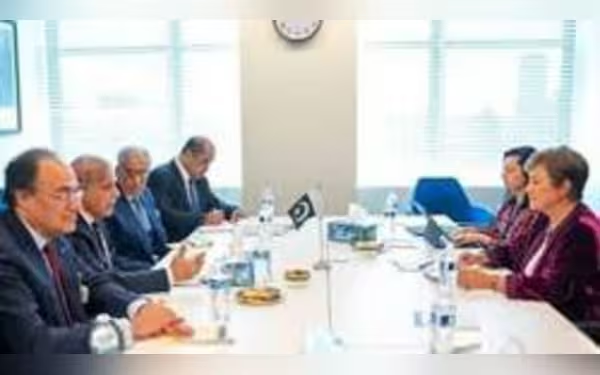Saturday, November 16, 2024 05:33 PM
IMF Approves $7 Billion Loan for Pakistan's Economic Recovery
- IMF approves $7 billion loan for Pakistan's recovery.
- Focus on job creation and tax reforms emphasized.
- International support highlights Pakistan's economic challenges.
 Image Credits: nation_pk
Image Credits: nation_pkThe IMF has approved a $7 billion loan to support Pakistan's economic recovery, focusing on job creation and necessary reforms.
In a significant development for Pakistan's economy, the International Monetary Fund (IMF) has approved a fresh loan package aimed at aiding the country in its economic recovery. This decision comes at a crucial time when Pakistan is grappling with high inflation and a pressing need for job creation. The IMF Managing Director, Kristalina Georgieva, emphasized the importance of this new bailout package, stating that it is designed to support the government in its efforts to stabilize the economy and promote inclusive growth.
During a recent meeting with Prime Minister Shehbaz Sharif, Georgieva described the discussions as "very productive." She highlighted that the new Fund-supported program will focus on ongoing recovery efforts, disinflation, and increased tax fairness. The goal is to implement reforms that will not only create new jobs but also ensure that growth benefits all segments of society. This approach is particularly vital for a country like Pakistan, where economic disparities can hinder overall progress.
The IMF's Executive Board has approved a substantial $7 billion Extended Fund Facility (EFF) for Pakistan. This financial assistance is contingent upon the government's commitment to implementing necessary reforms, including a significant expansion of the tax base. Such measures were reflected in the tax-heavy budget passed earlier this year, which aims to enhance revenue generation and fiscal stability.
Moreover, Nathan Porter, the IMF Pakistan Mission Chief, has confirmed that several friendly nations have provided "significant financing assurances" to Islamabad. These assurances are linked to the bailout package and extend beyond the agreement to roll over $12 billion in bilateral loans owed to these countries. This international support underscores the global community's recognition of Pakistan's economic challenges and the need for collaborative efforts to address them.
On a related note, the State Bank of Pakistan (SBP) announced that it received approximately $1,026.9 million under the EFF arrangement from the IMF. This amount represents the first tranche of the approved $7 billion package, with the SBP confirming that the funds will be reflected in its liquid reserves. The immediate release of this tranche is a positive step towards stabilizing the country's financial situation.
As Pakistan embarks on this new phase of economic recovery, it is essential for the government to remain committed to the reforms outlined in the agreement with the IMF. The success of this bailout package will depend not only on the financial assistance received but also on the effective implementation of policies that promote economic stability and growth. For the citizens of Pakistan, the hope is that these efforts will lead to a more prosperous future, where inflation is controlled, jobs are created, and the economy thrives.













